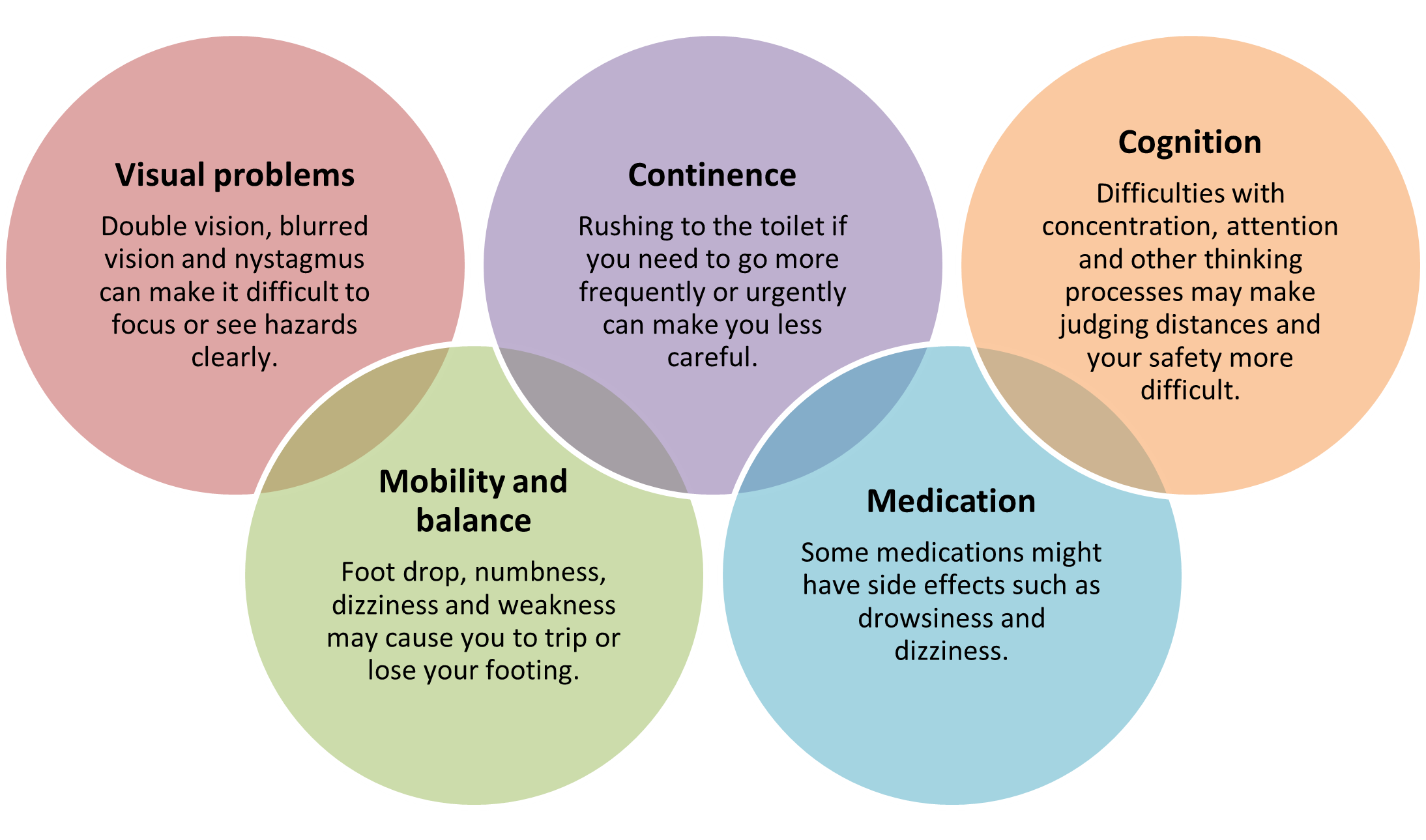Mobility
Walking difficulties
It can be common for people with MS to have some difficulties with walking. This could happen for many different reasons.
Common problems with walking
Symptoms with walking vary from one person to another and there are lots of factors that can influence these symptoms. Common difficulties are:
- Unsteadiness on walking or turning
- Slower, shorter steps
- Less confidence
- Needing support from walls, furniture, or other people
- Tripping and stumbling
- A heavy feeling in the legs when stepping forward
- Weakness of the leg when weight is on it
- Difficulty placing the foot on the ground
- Foot drop – where the front part of the foot does not lift up properly
Most of these difficulties are due to nerve messages not getting through properly. This can cause weakness, stiffness, or spasticity (see spasticity section).
If you have sensory changes in your legs, then this can alter the feedback from your body to your brain. This means that walking can require more concentration, and you can have problems with your co-ordination. If you are fatigued or try to do other things at the same time as walking, this can make it even more difficult.
Problems with your vision can have an impact on your walking too. For example, it can be difficult to place your feet or judge steps if you have blurred vision.
Feeling dizzy, shaky (having a tremor), or in pain can also make walking harder. This might affect your confidence or posture when moving around which can cause other problems, such as stress on other joints and long-term difficulties.
Getting help and advice early to manage walking difficulties can help to prevent these secondary changes in the long-term.
Support for walking difficulties
Depending on the reason for your walking difficulties, there are different things that can help you to stay mobile and keep your independence. We recommend that you discuss these difficulties at your appointments with the MS team.
Here are a few options of what could help.
- Physiotherapy assessment and personalised exercise programme to help with strength, balance, and some dizziness symptoms. This can be done with the MS Physiotherapist in the Dorset MS Service or with a community service depending on what your difficulties are
- Orthotics (splints) or Functional Electrical stimulation (FES) may help support weaker parts of your leg
- There may be medications that can help reduce spasticity and pain
- Walking aids can help support or give you confidence when walking
- Regular exercise and activity, such as yoga or Pilates, may help improve your strength and reduce fatigue
- Remove trip hazards in your own environment
- If you think you might need rails or aids to help you at home, you can be referred to your local community occupational therapy service. Please discuss this with a member of the MS Service
Orthotics and Functional Electrical Stimulation (FES)
Orthotics, also known as splints, are appliances that can help with your leg positioning, walking and comfort. They are most used for foot drop but there are also devices that could support your knee. Your physiotherapist or other members of the MS team can discuss these with you and refer you to your local orthotics service to be assessed for an appropriate device.
Further information about using orthoses to improve walking difficulties can be found here: https://mstrust.org.uk/news/expert/using-orthoses-improve-walking-difficulties
FES can be a very effective option to help manage walking difficulties if you have a foot drop due to MS. It is a treatment that uses electrical charges to a muscle that is weakened due to damage in the brain or spinal cord. The charge is applied through electrode pads on your skin and stimulates the muscles to make its usual movement. It stimulates your muscle at the front of your legs to lift your foot up when you are walking. There are a few FES Footdrop devices that are available, but the most common one used is the ODFS Pace device.
Further information about this can be found here:
Interview with FES user - MS - YouTube
Functional electrical stimulation (FES) | MS Trust
In Dorset, FES is not available on the NHS, it is therefore only available if self-funded. There are some options to trial a device, so if this if something you would like to discuss further, please contact the team and the MS Physiotherapist can discuss this with you.
Falls
People with MS may have an increased risk of falls and it most commonly occurs at home. Falling can affect your confidence, cause injury and loss of independence, and can be distressing.
Falling is often due to a combination of factors which can include objects in the environment, such as tripping over rugs or furniture, and health related issues. Here are some examples of how MS related symptoms could increase the risk of falling:

It is very common to lose confidence when you have fallen which can have an impact on your mobility and activity levels.
If you would like some further advice about this, then these websites have some useful hints and tips:
Falls | MS Trust - https://mstrust.org.uk/a-z/falls
Falls - NHS (www.nhs.uk) - https://www.nhs.uk/conditions/falls/
Home | Falls Assistant - https://fallsassistant.org.uk
Here are some podcasts by the MS Trust if you would like some more information about walking difficulties in MS.
Mobility problems and aids in MS (Part 1) | MS Trust
Mobility problems and aids in MS (Part 2) | MS Trust
Useful links:









